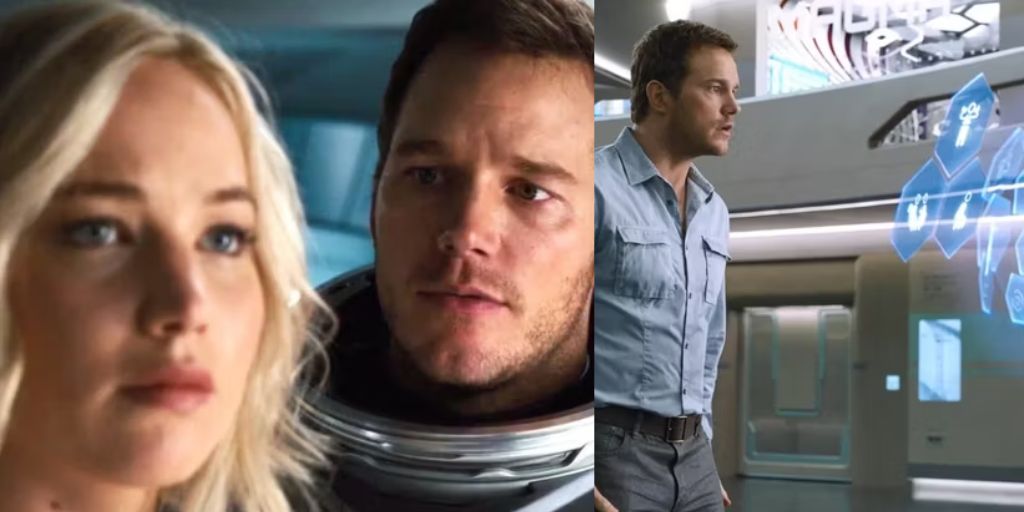“Passengers” is a film that seemed poised for success. It had an original story from Jon Spaihts, who later co-wrote both “Dune” films. Morten Tyldum, known for directing the Oscar-nominated “The Imitation Game,” was at the helm.
The movie also featured Chris Pratt and Jennifer Lawrence during peak career moments; Lawrence had just finished the “Hunger Games” series, and Pratt was coming off “Guardians of the Galaxy” and “Jurassic World.”
Despite these advantages, “Passengers” received mixed reviews, particularly for a plot twist kept secret in the marketing. With “Passengers” currently popular on Prime Video, it’s worth examining this twist and its impact on the film’s ending.
What Is ‘Passengers’ About?
“Passengers” is set in the distant future, where Earth’s deteriorating conditions force humanity to escape in massive starships for a new home. The journey takes decades, so passengers are put into hibernation. However, a malfunction wakes up engineer Jim Preston (Pratt) 90 years too soon.
Jim nearly loses his mind from isolation but eventually discovers a pod containing Aurora Lane (Lawrence), a successful journalist. Jim wakes Aurora, telling her that her pod malfunctioned, and they begin to fall for each other. A year later, Aurora learns the truth, and she is deeply upset.
Chris Pratt and Jennifer Lawrence Aren’t the Only People Woken Up on ‘Passengers’
Even with Pratt and Lawrence’s star power and chemistry, “Passengers” increases the stakes by waking up another passenger: chief deck officer Gus Mancuso (Laurence Fishburne).
Gus informs Jim and Aurora that multiple asteroid collisions not only caused their awakening but also severely damaged the ship, leaving everyone on board in danger.
Gus, who has access to certain ship areas, attempts to fix it but becomes ill due to his malfunctioning hibernation pod. Before he dies, Gus gives Jim and Aurora tools and codes to access the ship’s bridge.
‘Passengers’ Ends on a Romantic Note
Jim and Aurora find that the ship’s fusion reactors are badly damaged. To save the ship, they must vent the reactor. In true sci-fi fashion, things go awry, and Jim has to manually vent the reactor, almost dying in the process. Aurora saves him, and the ship is restored to full power.
After Jim is treated in the medical bay, he discovers that the pod can serve as an emergency hibernation unit and urges Aurora to use it so she can wake up with the rest of the crew. Instead, she decides to spend her life with him.

The film ends with the crew awakening to find Jim and Aurora having lived a full life together. While this ending might have been fitting in another movie, it highlights some of “Passengers'” issues.
“Passengers” Isn’t Always Sure What It Wanted to Be
One major problem with “Passengers” is that it fails to commit to a single genre. The sci-fi romance was better done in films like “The Fountain” and the “Matrix” trilogy.
The reveal that Jim woke Aurora is initially handled well—she tells him to stay away, and he worsens the situation by begging her to talk—but she eventually forgives him, despite the loss of her family and friends.
Some reviews, like those from Vox, described the film as “three movies in one,” while Time and Rolling Stone suggested it would have been more interesting if it had maintained a darker tone after Jim’s secret is revealed.
Jennifer Lawrence, in particular, has reservations about “Passengers.” In an interview with The New York Times, she shared that Adele had advised her against joining the film and that she wished she had listened: “Adele told me not to do it!
She was like, ‘I feel like space movies are the new vampire movies.’ I should have listened to her.” Ultimately, “Passengers” is a film conflicted about its own identity. Although it aimed to be an epic science fiction romance, its story required a different approach than what its cast and crew could provide.
“Passengers” is available to stream on Prime Video in the U.S.














